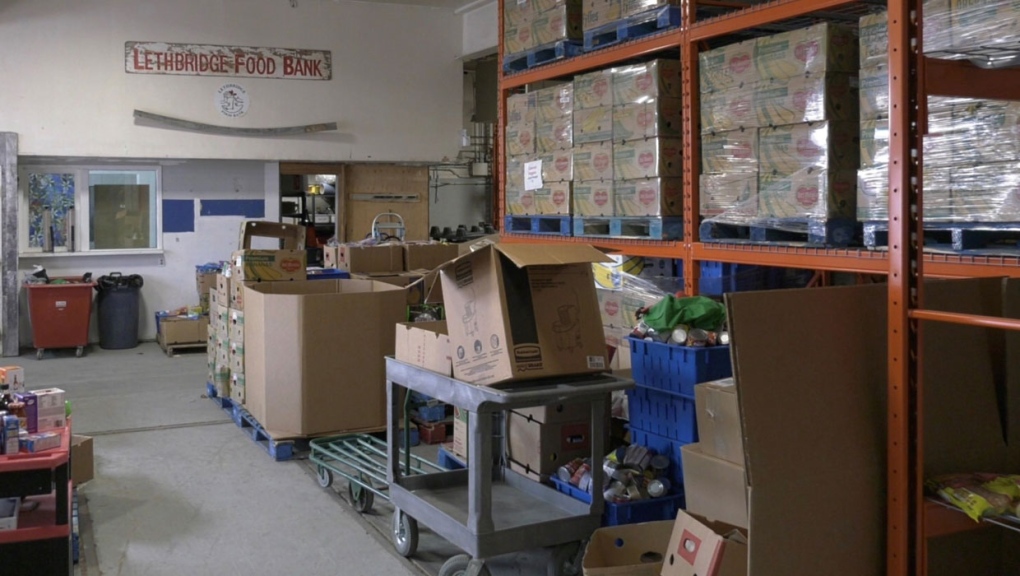Lethbridge outreach organizations see increase in clients as inflation rate rises
 Shoppers in Lethbridge are finding they are needing to pay more for groceries and other essentials, all thanks to a rapid increase of Canada's inflation rate.
Shoppers in Lethbridge are finding they are needing to pay more for groceries and other essentials, all thanks to a rapid increase of Canada's inflation rate.
With the inflation rate in Canada jumping to levels not seen in 40 years, outreach organizations in Lethbridge say the number of clients accessing supports has also grown.
“We’ve seen an increase in asks for temporary financial assistance, for support to find affordable housing and emergency housing funding to cover those expenses,” said Janelle Marietta, the executive director with United Way Lethbridge and southwestern Alberta.
According to Marietta, calls to 211 have nearly doubled over the past few months with more people requesting help because of the rising inflation rate.
Statistics Canada says the national consumer price index was recorded at 7.7 per cent in May compared to a year ago, the largest yearly increase since 1983.
However, Alberta’s provincial rate of inflation is 7.1 per cent, one of the lowest in the country. Rising oil and gas prices are the driving force to the rising cost of living.
“Fuel prices are going up, we're certainly seeing mortgage rates and interest rates going up, that's hitting the rental market and will continue to do so we're certainly going to anticipate seeing more need around emergency funds,” Marietta said.
The Lethbridge Food Bank has also seen an increase in the number of individuals and families needing support as a result of the high inflation.
“We’ve seen a rise of 150 families more in the month of May compared to last year that we've needed to help, that trend doesn't seem to be going down this month,” said Mac Nichol, the executive director of the Lethbridge Food Bank.
Nichol says along with the food bank helping more individuals, the price of groceries has also gone up for the organization.
He says things like edible fats and oils are up 30 per cent, with fresh vegetables up more than 10 per cent. In total, the average price of food is up 9.7 per cent and economists say, there's a few reasons as to why inflation is so high.

“That's the Russian invasion of Ukraine, and really tight oil and natural gas supplies. So as long as the war is going on in Ukraine and as long as oil and natural gas prices stay high, that will have a you know an upward pressure on prices,” said Rob Roach, chief economist with ATB.
Roach believes the inflation rate will start to decrease in the second half of 2022.
“As consumers, we're likely to continue to face these high prices, really, until something gets resolved with the invasion of Ukraine. And we start to see energy markets get into a bit more balanced as well,” Roach added.
Marietta and Nichol say even if the inflation rate drops, demand for supports is expected to the same.
“We’re assuming that the numbers we have right now are going be consistent numbers or go up, I would be very surprised to see them go down,” said Nichol.
CTVNews.ca Top Stories

Bodies found by U.S. authorities searching for missing B.C. kayakers
United States authorities who have been searching for a pair of missing kayakers from British Columbia since the weekend have recovered two bodies in the nearby San Juan Islands of Washington state.
Amid concerns over 'collateral damage' Trudeau, Freeland defend capital gains tax change
Facing pushback from physicians and businesspeople over the coming increase to the capital gains inclusion rate, Prime Minister Justin Trudeau and his deputy Chrystia Freeland are standing by their plan to target Canada's highest earners.
'It's discriminatory': Individuals refused entry to Ontario legislature for wearing keffiyeh
Individuals being barred from entering Ontario’s legislature while wearing a keffiyeh say the garment is part of their cultural identity— and the only ones making it political are the politicians banning it.
BREAKING Mounties will not be charged in shooting death of B.C. Indigenous man
Three Mounties in British Columbia will not face charges in the killing of a 38-year-old Indigenous man on Vancouver Island in 2021.
Douglas DC-4 plane with 2 people on board crashes into river outside Fairbanks, Alaska
A Douglas C-54 Skymaster airplane crashed into the Tanana River near Fairbanks on Tuesday, Alaska State Troopers said.
Tom Mulcair: Park littered with trash after 'pilot project' is perfect symbol of Trudeau governance
Former NDP leader Tom Mulcair says that what's happening now in a trash-littered federal park in Quebec is a perfect metaphor for how the Trudeau government runs things.
'It's just so hard to let it go': Umar Zameer still haunted by death of Toronto police officer
“It's just so hard to let it go. I mean, everyone is telling me, ‘you have to move on,’ but I know someone is not here [anymore]. So I don't know how I will move on." That’s what Umar Zameer, the man recently acquitted in the death of a Toronto police officer, told CTV News Toronto in a sit-down interview on Tuesday.
NASA hears from Voyager 1, the most distant spacecraft from Earth, after months of quiet
NASA has finally heard back from Voyager 1 again in a way that makes sense. The most distant spacecraft from Earth hadn't sent home any understandable data since last November.
Saskatchewan households will continue to receive carbon tax rebate: Trudeau
Households in Saskatchewan will continue to receive Canada Carbon Rebate payments, despite the province refusing to remit the federal carbon price on natural gas, Prime Minister Justin Trudeau said Tuesday.































